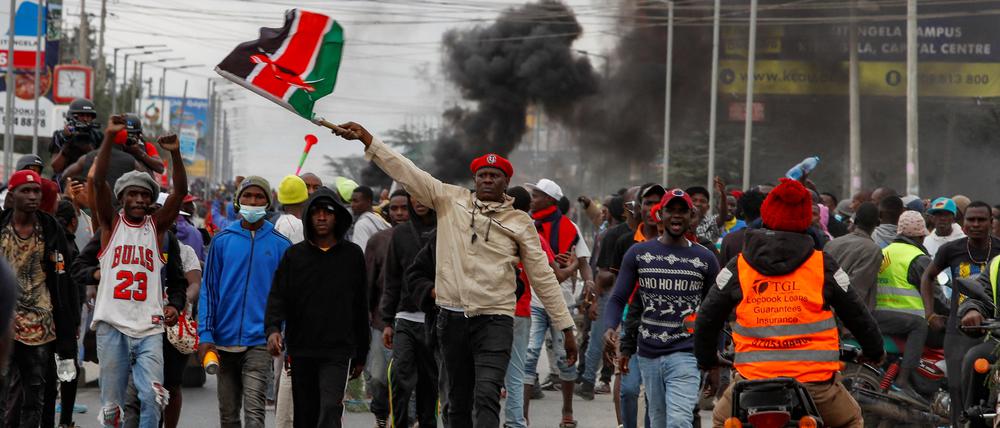Kenya
Where is President Ruto steering the country?

Gen z protests in Kenya, June 2024
© REUTERS/MONICAH MWANGIIt was supposed to be a liberating blow. On Thursday evening (July 11, 2024), Kenya's President Ruto published a press release. Three pages of praise for his own government work were followed by the actual message on page four: all ministers and the Attorney General have been dismissed from their posts with immediate effect. The only exception: the Prime Minister, who also heads the Foreign Ministry. Ruto also announced in the statement that he would hold talks with immediate effect in order to put the government on a broader footing.
A government of national unity as a last resort to save Kenya - long the anchor of stability in East Africa - from a national crisis?
That might not be easy at all. The Generation Z protest movement, which triggered the current crisis in June with its demonstrations against a bundle of tax increases, immediately called for new actions. On Tuesday (July 16), they want to take to the streets again and paralyse public life in Kenya once more. “Rage and Courage” is the motto this time and the social media campaign is running under the hashtags #RutoMustGo and #Totalshutdown.
Meanwhile, their discontent is directed against corrupt politics in general and against the brutal violence used by the police to suppress the protests. At least 39 demonstrators have been shot dead in the past two weeks. In addition, 13 mutilated bodies were discovered in the eastern part of Nairobi at the weekend. President Ruto had vowed to end extrajudicial killings in Kenya once and for all.
At the same time, Generation Z is inspired by its own success. Two days after the large demonstration in which the parliament in Nairobi was briefly occupied, President Ruto withdrew the tax law, has now dismissed almost all ministers and forced the police chief to resign.
This concession by the government has not defused the mood, but on the contrary has provoked even more radical demands: Resignation of the president, arrest of all police officers who fired the fatal shots at demonstrators, release of those arrested and repayment of the money that the corrupt government has stolen from the Kenyan people since the 2022 election. Calls for the dissolution of parliament and new elections are also growing louder on social media.
In this situation, putting together a new cabinet is anything but easy. Which qualified politician will take on a ministerial post if it is not clear whether the government will survive the next few months?
What's more, the Azimio coalition around opposition leader Raila Odinga is itself divided in light of the recent protests. Affectionately known as Baba (father) by many, Odinga has been the president's opponent for decades, but also his main point of contact when it came to negotiating compromises. Around a year ago, he ended the last major wave of protests following a deal with President Ruto. In return, Ruto supported Odinga's candidacy for the chairmanship of the African Union Commission. Now, it is said, the almost eighty-year-old Odinga wants above all to secure his own influence and prevent the current political class from being buried alive by the Gen Zs. This has met with fierce resistance within his party, the ODM. Many younger ODM leaders are counting on the “revolution” being completed - and not stopped. The party's influential secretary general and senator from Nairobi, Edwin Sifuna, and other senators urged their party leader Odinga to reject the president's offer of a national dialogue.
The future of the country is therefore completely open. Most of the ministries are without leadership and the president has been counted out. Without the planned tax increases, there are huge holes in the national budget that the government can only plug with spending cuts. This will give rise to further dissatisfaction amongst the people. There is currently no point of contact for a national dialogue.
The president is still fighting for his office. The next few weeks will show whether he can put together a new cabinet. If not, the country will be left without a government. Early elections would then be the only way out. But there is not even a functioning electoral commission that could prepare these elections.
In any case, Western partners are increasingly concerned about the country's stability and its traditional ties to the USA and Europe. Criticism of the International Monetary Fund (IMF) and the strict conditions with which it is forcing the highly indebted Kenya to increase its state revenues is becoming increasingly clear during the protests. In addition to rampant corruption, many see this as the cause of the tax increases and the resulting protests. So the big partners and donors from the West are also in demand. If they want to preserve Kenya as an anchor of stability in East Africa, they must help President Ruto to form a new government in the short term and find a way to reduce the country's debt burden in the medium term without overburdening its people.
Stefan Schott is Regional Director for East Africa at the Friedrich Naumann Foundation in Nairobi. The article was published on Der Tagesspiegel.
